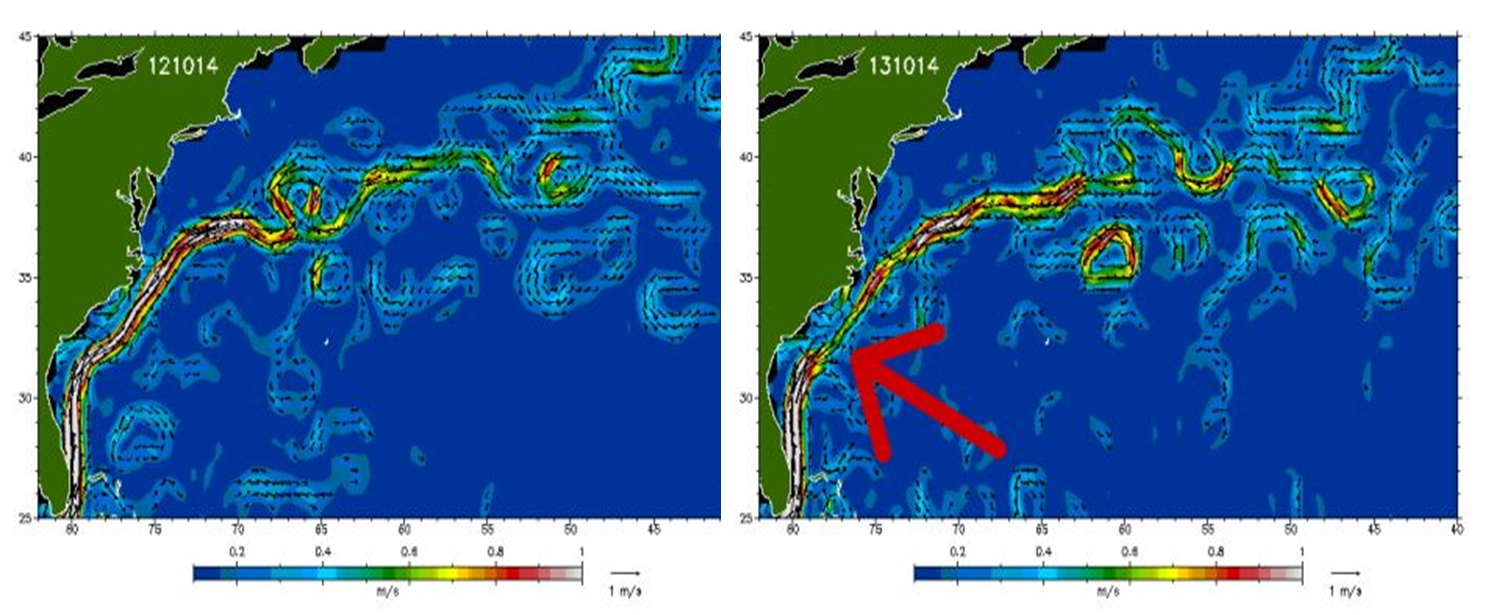German meteorologist Dominik Jung has a commentary today at his wetternet.de site where he looks at the Atlantic Gulf Stream. The commentary is titled: “Is the Gulf Stream Now Losing Its Steam?”
Over the last few days Central Europe has been enjoying almost summerlike temperatures as a weather system is drawing warm air from Mediterranean to the south. But this of course is a temprrfary weather situation and things will soon be cooling off.
There have been a number of signs pointing to another cold winter, and meteorologist Jung today points to yet another: a disrupted Gulf Stream.
The Gulf Stream is a powerful, warm Atlantic ocean current that originates at the tip of Florida and pumps warm water along the eastern coastlines of the North America and across the Atlantic over to Europe, thus keeping the north of the old continent relatively warmer in the wintertime.
Jung shows two charts of the Gulf Stream, which I’ve placed side-by-side. The left one from 14 October 2012 and the right one a year later from 14 October 2013.
Gulf Stream: left 212, right 2013. Source: DEOS, TU Delft
Jung describes the charts as follows:
One year ago off the coast of North America there was a strong continuous current which one could describe as quite healthy. From Florida and along the entire coast of North America the current speed was more or less uniformly high.
But compared to 2012 this year’s Gulf Stream shows a considerably disrupted flow. Already at the coast of North America the speed breaks down considerably compared to last year (see red arrow). At some places the speed is down to one half.”
So could this have an impact on Europe’s coming winter? Jung thinks this is a real possibility. He continues:
For now it is not clear what exactly the origin of the flow speed anomaly is. Of course the Gulf Stream remains intact and is not interrupted – an interruption would undoubtedly be fatal for our climate [in Europe]. In any case the flow has reduced considerably and thus the transport of heat to Europe has been considerably throttled, and that right before the coming start of winter. Never over the last 5 years has the Gulf Stream along North America been so weak as it is at this time of the year.
That could be another sign for an unusually colder than normal winter.”
It would be interesting to see what other meteorologists have to say on this.






Here’s my question: What would have a greater impact on Northern hemisphere weather and climate? a) the heat released from 1 million sq km more of open sea water in the Arctic or b) the Gulf Stream reducing to half its strength and thus delivering only half the heat?
I don’t know, but does it matter? Both heat sources are reduced by about the same amount, as well as most other heat sources. Have the stores stocked up on long underwear?
The Arctic ice cap is 60% larger this year in August 2013 than August 2012. Nasa released satellite images of both years. Global warming is a lie. Global cooling moving into a mini ice-age is whats really coming. And when it hits it will hit fast.
An alternative point of view:
http://www.ldeo.columbia.edu/res/div/ocp/gs/
Ah, wonderful demolition, thanks!
It is one of the regularly recurring rituals of the German press to be terribly worried about the Gulf Stream. Ignore it, it’ll go away after many talking heads have spent many weeks debating it; from pure boredom.
A funny thing happened at the modelers in Bremen. Scroll down to last chart on page.
http://www.iup.uni-bremen.de:8084/ssmis/#Ice_Extent
h/t Latitude
The problem with this is that the gulf stream can vary considerably. I’m not seeing any significant reduction in North Atlantic ocean heat content. The South Atlantic, though, is cooler than usual.
But there is a question is: how long does this disrupted flow take? A couple of months, a week. You haven’t mentioned it. You’ve just compared two different pictures within a year, but there is no information on kind of this disturbance. Is it permanent or just caught at this moment?
I agree. Herr Jung does not mention that. But, it’s still worth thinking about.
Is the variability of the Gulf Stream driving AMO ?
This http://www.cpc.ncep.noaa.gov/products/CFSv2/htmls/euT2me3Mon.html says differently. BUT I don’t believe any of the forecasts.
http://tallbloke.wordpress.com/2012/03/29/the-gulf-stream-today/
[…] 24-10-13: Michele links a post which confirms his observations and predictions: Looks like Europe might be in for another very […]
This link
http://weather.unisys.com/surface/sst_anom.gif
showos that the North Atlantik as a whole seems quite warmer than the base period, although this is not named.
If so, how does this match to the article? Shouldn’t the Eastern North Atlantik become colder?
Are we really in for a cold winter when the waters in front of our house are warmer?
Dear Pierre, if someone answers my questions, can you please submit it to my e-mail? Thanks a lot!
Chris Frey
Will do so
An alternative point of view:
http://www.ldeo.columbia.edu/res/div/ocp/gs/
Not really a demolition. More an extension.
That article recognises the importance of water temperatures but suggests that for Western Europe wind direction is more important than the Gulf Stream in itself.
My view is that it is a matter of the top down atmospheric solar driven forces and the bottom up ocean driven forces interacting to rearrange the atmospheric circulation.
The primary driver is always the sun but heavily modulated by the ocean response.
The sun affects global cloudiness which affects the amount of energy able to enter the oceans in the first place.
Hmm, the thing is, the last few winters have had colder spells than the previous 10 years, in fact the last 5 winters have had loads more snow than the winters before it so maybe this means things are about to reverse and a mild winter might be expected?